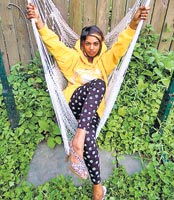
I'm a tiger, I'm a tigerRapper M.I.A. or Maya Arulpragasam creates musical revolution in politics. Prevented from entering America, she travels the world for CD with an international appeal NEW YORK (AP) - A new recording artist who finds success can expect many perks, including financial rewards. But perhaps the most exciting side benefit is the explosion of options. Superstars court you for collaborations. You get exclusive, V.I.P. invites. And you inch ever so closer to becoming part of music's mainstream. Rapper M.I.A. had all of that and more within her grasp after she released her debut CD, "Arular" - an exotic blend of intoxicating world rhythms made gritty by her hard-hitting, politically charged rhymes. The album was a critical success, sold a respectable 130,000 copies (according to Nielsen SoundScan), made her an indie-scene darling and got her raves from the likes of Pitchfork and The New York Times.
But she couldn't partake of much of that good fortune, thanks to legal limbo that kept her out of the United States for a good part of the last two years -- unable to secure a long-term work visa to enter the country thanks to familial ties to guerrilla fighters in her homeland, Sri Lanka, and perhaps her own biting words on record. "After the 'Arular' album I had financial freedom but I couldn't have the other sort of artistic freedom, because people sort of like scrutinizing the words I said, and I couldn't get a visa because of it," says M.I.A, who was born in London but spent most of her youth in the tumultuous Sri Lanka before settling in Britain with her mother and siblings. "On the one hand, you get all the opportunities; you can go to Beverly Hills, you can work with Timbaland, you can go to Gwen Stefani's house, but you can't get in. Creditwise, all the artists are like, 'Oh, she's really amazing,' but I couldn't go and participate in any of that." So instead of waiting for an invitation to come play in their world, M.I.A. retreated further into her own. She travelled the globe to record her sophomore album, "Kala," but instead of heading to posh locales with state-of-the-art studios, she landed in places like war-torn Liberia, spent time with Aborigines in Australia, drummers in India and musicians in Trinidad, resulting in an album that has a decidedly Third World perspective -- one that's not heard nearly enough in music today, in M.I.A.'s opinion. "The thing is, an American voice, in every shape, form, size, is getting heard on the planet all over the world. If you go to a mud hut in Africa, they are listening to an American voice," M.I.A. says with her distinct British accent. "(But) a two-way exchange can exist." M.I.A. (real name: Maya Arulpragasam) helped further that exchange with the 2005 release of "Arular," a dizzying mix of reggae ,rap and other genres that made for an eclectic, fresh new sound. With her striking looks and deft rhyming skills, she was one of the few rappers from overseas to make a dent in the American rap scene.
Like much of American rap, M.I.A.'s rhymes contained references to violence - but it had nothing to do with a gangsta lifestyle. Instead, she referred to another kind of warfare, that which had kept Sri Lanka in civil war for almost three decades. Known as Tamil Tigers, separatists have been fighting since to create an independent homeland for ethnic minority Tamils after decades of alleged discrimination by majority Sinhalese-controlled governments. M.I.A.'s father, Arul Pragasam, has been active in the group; "Arular" takes its name from his, and is filled with references to uprisings and overcoming oppression. "M.I.A., missing in action, going to start a revolution," she chants on one of the album's skits. Her political stance may have made her more exciting to the music world, but to the United States, officials apparently worried she could be inciting -- so they denied her a visa to enter the country, despite her growing success here. Though she brought an apartment in Brooklyn, it remained empty as she kept reapplying to enter the country. In the meantime, M.I.A. had already decamped from London, so for the next two years, she was in essence, homeless, leaving her out of sorts and unsettled."Personally I just needed a home, like I needed somewhere that I could just have a train of thought and live with it and then wake up tomorrow and have the same train of thought," she says wistfully. However, not being able to record in the United States with A-list producers may have enhanced her artistic endeavors, as she layered her album input from far-flung places. "India gave me the bulk of it musically, just building the elements, and then Trinidad just gave me loads of inspiration to put those elements together and create songs and light a certain vibe," she says. Of course, it's not just the sound that makes the album unique -- it's the words that accompany it, and they are still fierce. On "Kala," she references warlords, raps with the artist Afrikan Boy about poverty, and talks about oppression of the world's poor. But she's not as blatantly political as she was on "Arular." "I had to morph," she says with a coy smile. "I'm going to get into more trouble for saying this, but it was morphing from being lyrically political into just living political and being comfortable with that. Sometimes you don't have to shout out about stuff. "It's kind of like what people say about money: they say that money talks but wealth whispers, and I think you can apply that to being political." That approach may have paid off: early this summer, she finally gained her work visa, and celebrated by relaxing in her New York apartment. Though it took her two years to get settled in, in the end, M.I.A. doesn't feel as if she's lost anything by not being in the United States. In fact, she thinks it was the United States that may have come out the loser for the delay. "Me not being able to get into the country actually forced me to go to Africa and India, which actually works out worse for whoever wants me to shut up, because the worst thing you can do is make Africa look cool, or like make India look cool," she says. "They just made it a step closer for a bridge to get built between modern developing countries and modern Third World and America, which is what needs to happen." |
|| Front
Page | News | Editorial | Columns | Sports | Plus | Financial
Times | International | Mirror | TV
Times | Funday
Times || |
| |
Copyright
2007 Wijeya
Newspapers Ltd.Colombo. Sri Lanka. |

